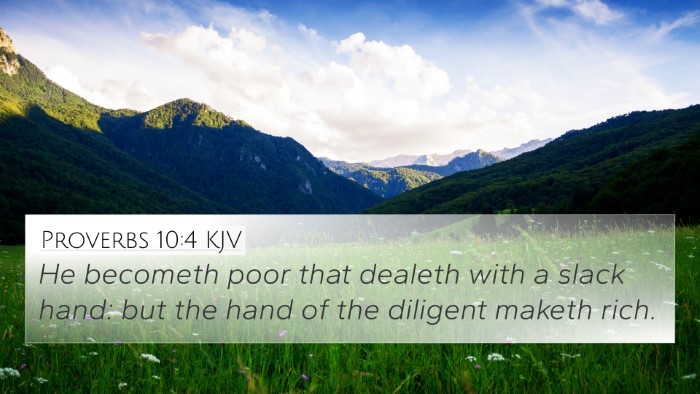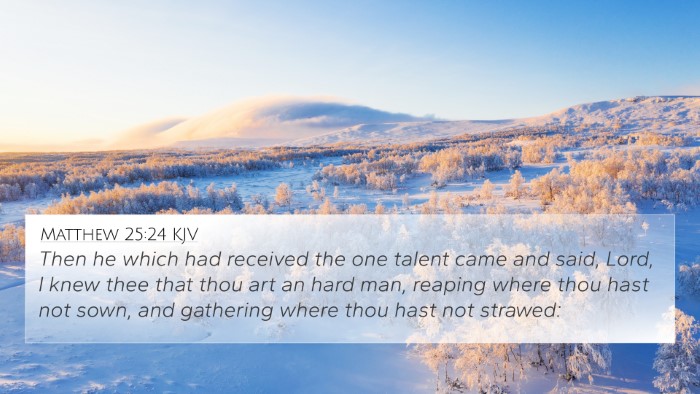Proverbs 20:4 - Meaning and Interpretation
Proverbs 20:4 states: "The sluggard will not plow by reason of the cold; therefore shall he beg in harvest, and have nothing."
Summary of Proverbs 20:4
The verse serves as a stark warning against laziness and procrastination, highlighting the importance of diligent work, especially in the context of agriculture and the need for provision.
Insights from Public Domain Commentaries
- Matthew Henry: Henry emphasizes the consequences of idleness. He states that the sluggard avoids work due to temporary discomforts, leading to long-term deprivation. The harvest is a metaphor for rewards, which comes to those who labor.
- Albert Barnes: Barnes notes that this verse reflects a common observation of human behavior—many miss their opportunities because they allow trivial matters to deter them from essential tasks. He points out the practical consequences—remaining hungry during harvest due to negligence.
- Adam Clarke: Clarke elaborates on the socio-economic implications of laziness. He explains that failure to prepare and work diligently can lead to poverty. He also ties this principle to various Biblical themes concerning diligence, personal responsibility, and God’s provision.
Connecting Proverbs 20:4 with Other Scriptures
Understanding Proverbs 20:4 benefits from cross-referencing with other Bible verses that deal with work, diligence, and consequences of slothfulness. Below are some relevant verses:
- Proverbs 10:4: "He becomes poor who works with a slack hand, but the hand of the diligent makes rich."
- Proverbs 13:4: "The soul of the sluggard desires, and has nothing; but the soul of the diligent shall be made fat."
- Proverbs 21:25: "The desire of the slothful kills him; for his hands refuse to labor."
- 2 Thessalonians 3:10: "For even when we were with you, this we commanded you, that if any would not work, neither should he eat."
- Ecclesiastes 10:18: "By much slothfulness the building decays; and through idleness of the hands the house drops through."
- Colossians 3:23-24: "And whatever you do, do it heartily, as to the Lord and not to men, knowing that from the Lord you will receive the reward of the inheritance."
- Proverbs 24:30-34: This passage recounts the story of the slothful man and the consequences of his inaction, illustrating how neglect leads to loss.
Thematic Connections and Inter-Biblical Dialogue
The connections between these verses illustrate a consistent Biblical theme of the blessings associated with hard work and the dangers of laziness. Proverbs 20:4, alongside these references, creates a dialogue on diligence across both the Old and New Testaments, emphasizing God's design for human work ethic.
Tools for Bible Cross-Referencing
When studying Proverbs 20:4 and its implications, one might consider the following tools and methodologies for effective Bible cross-referencing:
- Utilizing a Bible concordance to identify related verses by keywords, such as "work" and "sloth."
- Employing a cross-reference Bible study guide to trace connections and themes throughout Scripture.
- Implementing Bible cross-reference systems that can connect verses thematically or contextually.
Practical Applications
The teachings of Proverbs 20:4 encourage individuals to evaluate their daily lives and work habits. Believers are prompted to engage in self-reflection on areas of laziness and to cultivate a spirit of diligence in their vocations.
Conclusion
Proverbs 20:4 illustrates the stark contrast between the sluggard and the diligent worker, serving as a timeless reminder that true fulfillment and sustenance come from hard work. The interconnectedness of various scriptures reinforces the necessity for proactive engagement in one's responsibilities, illustrating how diligent effort leads to eventual rewards.












